+91 858 886 6045
Khajuraho Tourism
Introduction
History, art and sculpture beautifully come together in Khajuraho, the site of the largest group of medieval Hindu 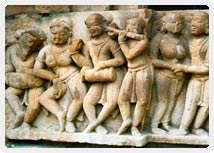 and Jain temples.
and Jain temples.
Extensive erotic artwork is a hallmark of the temple architecture, inspired by the Kamasutra. Once a capital of the Chandela Rajputs, it has emerged as India's most visited tourist destinations.
Khajuraho is a village in the Indian state of Madhya Pradesh, located in Chattarpur district. The name Khajuraho comes from the Hindi word khajur meaning date palm.
The Khajuraho temples were built over a span of a hundred years. Strangely, the temples of Khajuraho never underwent massive destruction. They are fine examples of Indian architectural styles that gained popularity in medieval times.
The elaborate style of architecture that is characteristic of the Khajuraho complex merits description. The Khajuraho temples, constructed with spiral superstructures, subscribe to the northern Indian shikara temple style and often to a Panchayatna plan. While a few of the temples are dedicated to the Jain tirthankaras, the rest have been built in the name of the Hindu trinity (Brhama,Vishnu and Shiva) and various manifestations of the Devi.
A Panchayatana temple has four subordinate shrines at every corner surrounding the main shrine at the centre. The temples are grouped into three geographical divisions: western, eastern and southern. The shikharas or spires lend a special character to the Khajuraho temples, by virtue of their graded rise.
The Khajuraho temples do not bear erotic artwork inside the temple or near the deities.The Khajuraho temples are now set in a parkland landscape. The Khajuraho group of monuments are a UNESCO World Heritage Site.
Eastern group of temples
This temple is dedicated to the Jain saint Adinath. The architecture on the temple walls is elegant, with images of yakshis on the walls as well as courtThis temple was built in the late eleventh century during the reignof Kirtavarman and is an important part of the Jain temple complex.
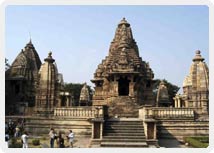 Is the biggest in the Jain complex. Its intricate carvings are a defining feature of the temple. It is built of varying shades of sandstone right from cream and red to black. The recurring theme of the temple sculpture is St. George vanquishing a dragon.The theme is repeated at regular intervals, only with mild variations.Other sculptures depict women in everyday life. The famous scenes of a women taking a thorn from her toe, a women cuddling her baby have been etched on the osuthern face of the temple.Several statues in yogic posture surround the temple,a style typical of Jain architecture but is absent from the Hindu temples in Khajuraho. The statue inside the temple is also very Jain – the sanctum houses a life -sized sculpture .
Is the biggest in the Jain complex. Its intricate carvings are a defining feature of the temple. It is built of varying shades of sandstone right from cream and red to black. The recurring theme of the temple sculpture is St. George vanquishing a dragon.The theme is repeated at regular intervals, only with mild variations.Other sculptures depict women in everyday life. The famous scenes of a women taking a thorn from her toe, a women cuddling her baby have been etched on the osuthern face of the temple.Several statues in yogic posture surround the temple,a style typical of Jain architecture but is absent from the Hindu temples in Khajuraho. The statue inside the temple is also very Jain – the sanctum houses a life -sized sculpture .
This Jain temple was built in the late tenth century. It depicts as its theme the sixteen drsma of Mahavira’s mother and a jain deity on the celestial vehicle Garuda. The name comes from its location in the village of Ghantai, to the south east of Khajuraho.
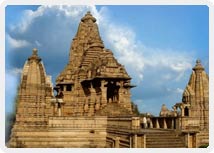 The Brahma Temple was dedicated to Vishnu, the Hindu God of Preservation. The temple stands on an 11 feet high platform on the banks of the Ninora Tal, the largest tank in Khajuraho. The temple takes the form of a square shrine erected on granite pillars. The 'jagati' is plain with 12 prominent offsets and its lower courses remain submerged in the water of the tank for some months of the year. The Khajuraho group of temples are noted for lofty terraces (jagati) and functionally effective plans. The roof is made of sandstone, while the structure below it is made of granite. The shrine is set with projections from each side, to represent the cardinal directions.A vestibule-like projection on the east forms the entrance while the northern and southern faces bear windows with impressive lattice work.
The Brahma Temple was dedicated to Vishnu, the Hindu God of Preservation. The temple stands on an 11 feet high platform on the banks of the Ninora Tal, the largest tank in Khajuraho. The temple takes the form of a square shrine erected on granite pillars. The 'jagati' is plain with 12 prominent offsets and its lower courses remain submerged in the water of the tank for some months of the year. The Khajuraho group of temples are noted for lofty terraces (jagati) and functionally effective plans. The roof is made of sandstone, while the structure below it is made of granite. The shrine is set with projections from each side, to represent the cardinal directions.A vestibule-like projection on the east forms the entrance while the northern and southern faces bear windows with impressive lattice work.
Southern Group of Temples
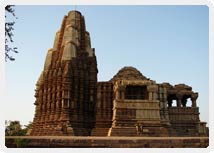 This is by far the most impressive temple in Khajuraho, simply because of its sculpture work, especially in the Shalbhanjika. It is a fully developed temple with the ardhamanadap, the mandapa, the maha mandapa, the antarala and the garbha griha. The top of the maha mandap is a series of diminishing circles of overlapping stoneswith. The temple is dedicated to Lord Shiva as the sanctum houses a shivlingam. The superstructure follows a panchayatna plan, with subsidiary shikhars built around the central shikhara. Contrasting themes have been ecthed on the temple walls-the sensual versus the repulsive with the bodies of the apsaras on one hand and the squat figures of beasts on the other.Another interesting theme lies in the flying wizards, journeying through space with their consorts and playing musical instruments.
This is by far the most impressive temple in Khajuraho, simply because of its sculpture work, especially in the Shalbhanjika. It is a fully developed temple with the ardhamanadap, the mandapa, the maha mandapa, the antarala and the garbha griha. The top of the maha mandap is a series of diminishing circles of overlapping stoneswith. The temple is dedicated to Lord Shiva as the sanctum houses a shivlingam. The superstructure follows a panchayatna plan, with subsidiary shikhars built around the central shikhara. Contrasting themes have been ecthed on the temple walls-the sensual versus the repulsive with the bodies of the apsaras on one hand and the squat figures of beasts on the other.Another interesting theme lies in the flying wizards, journeying through space with their consorts and playing musical instruments.
The outside ornamentation is equally rich.Extraordinary erotic work such as couples in an intimate embrace is what has become over time the defining feature of Khajuraho temple architecture.
Three kilometers south of Khajuraho, in the village of Jatkari lie the two temples now in ruins. One of them is a Shiva temple enshrining a marble ligham. The other one enshries a 3metres high image of Chatturbhuja or Vishnu. The doorway bears exquisite carvings of Brahma, Vishnu and Shiva. It is a nirandhara temple, with its layout design consisting of a sanctum, mandapa and an entrance porch. The shikhara of the temple is simply done.
There are three grades of sculptures on the exterior of the temple. The temple is a precursor of the Duladeo temple but however a smaller version. It can be assigned to circa 1100.
Western Group of Temples
The Chitragupta Temple has been constructed , exalting Surya or the Sun God. The inner sanctum bears an image of the Sun God riding a chariot, a typical representation of the Sun God. Other parts of the temple illustrate several themes such as royal processions, dancers in extravagantly carved styles.
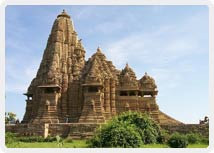 Is the largest and the most majestic structure in the entire complex, dedicated to Shiva, who is both ,the force of destruction and saviour.One is taken in by the sculptural profusion sensual images of celestial beings, The architecture speaks of attempts to represent Shiva in his Kailash form. Carvings on the wall occur in bands, with court life, army and elephant processions as some of the themes .Deities from the Hindu fold, lovers in intimate embrace are other forms the images take. The temple presents itself in a 5 part layout , with an ardhamandapa, mandapa, a mahamandapa supported with pillars. The sanctum is houses the lingam and the main shrine is home to several carvings of women in a variety of depictions. Shiva has also been represented in a variety of incarnations. The temple freize or the entrance is one of the most impressive in the entire temple complex, by virtue of the extravagant artwork it has. The Kandarya Mahadeo is a standing example of architectural brilliance , by virtue of it plan, symmetrical proportions and sculptural value.
Is the largest and the most majestic structure in the entire complex, dedicated to Shiva, who is both ,the force of destruction and saviour.One is taken in by the sculptural profusion sensual images of celestial beings, The architecture speaks of attempts to represent Shiva in his Kailash form. Carvings on the wall occur in bands, with court life, army and elephant processions as some of the themes .Deities from the Hindu fold, lovers in intimate embrace are other forms the images take. The temple presents itself in a 5 part layout , with an ardhamandapa, mandapa, a mahamandapa supported with pillars. The sanctum is houses the lingam and the main shrine is home to several carvings of women in a variety of depictions. Shiva has also been represented in a variety of incarnations. The temple freize or the entrance is one of the most impressive in the entire temple complex, by virtue of the extravagant artwork it has. The Kandarya Mahadeo is a standing example of architectural brilliance , by virtue of it plan, symmetrical proportions and sculptural value.
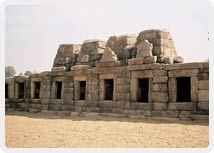 The oldest of the surviving temples of Khajuraho is Chaunsat Yogini, a construction dedicated to goddess Kali. It stands out as the sole granite construction in the entire Khajuraho complex. The name chaunsat (sixty-four) is derived from the cells of 64 attendants of Goddess Kali. Only half the figure have survived.This temple that is part of the western group assumes a unique quadrangular shape. Built in late 9th century, situated about three furlongs south of the Kandariya Mahadeva Temple, this monument belongs to a very rare class of temples, dedicated to the sixty-four Yoginis, which represented innumerable manifestations of Shakti, the female force. The temple has been erected on a platform around 15 feet high from 14 to 18 feet high. It is the earliest surviving shrine of the temple complex.
The oldest of the surviving temples of Khajuraho is Chaunsat Yogini, a construction dedicated to goddess Kali. It stands out as the sole granite construction in the entire Khajuraho complex. The name chaunsat (sixty-four) is derived from the cells of 64 attendants of Goddess Kali. Only half the figure have survived.This temple that is part of the western group assumes a unique quadrangular shape. Built in late 9th century, situated about three furlongs south of the Kandariya Mahadeva Temple, this monument belongs to a very rare class of temples, dedicated to the sixty-four Yoginis, which represented innumerable manifestations of Shakti, the female force. The temple has been erected on a platform around 15 feet high from 14 to 18 feet high. It is the earliest surviving shrine of the temple complex.
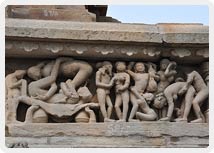 This is the oldest structure in the western group of temples dedicated to Lord Vishnu. The entrance of this temple welcomes you with images of the Trinity and Lakshmi , Vishnu's consort. The sanctum bears intricate carvings of a three-headed idol of Vishnu’s incarnations. Emperor Lakshavarma was instrumental in the creation of this temple, after he was gifted the idol by the Pratihara ruler Devapala. The temple subscribes to the panchayatana scheme, with the main shikara being surrounded by four others. It also depicts scenes from battle, hunting while the porch bears the lotus design. The pillars on each corner depict Apsaras or celestial beings on carved brackets and among the finest of sculptures, these eight figures, on each column, represent each sect of the Tantras. Architecturally, this temple has some remarkable features. The roofs of its 'maha-mandapa', 'mandapa' and the entrance porch are of the 'phamsana' type and show a pyramidal superstructure of a straight contour, which is crowned by a prominent chime. It is one of the only two temples at Khajuraho, the other being Parsvanath, displaying bold sculptures at the door-lintels.
This is the oldest structure in the western group of temples dedicated to Lord Vishnu. The entrance of this temple welcomes you with images of the Trinity and Lakshmi , Vishnu's consort. The sanctum bears intricate carvings of a three-headed idol of Vishnu’s incarnations. Emperor Lakshavarma was instrumental in the creation of this temple, after he was gifted the idol by the Pratihara ruler Devapala. The temple subscribes to the panchayatana scheme, with the main shikara being surrounded by four others. It also depicts scenes from battle, hunting while the porch bears the lotus design. The pillars on each corner depict Apsaras or celestial beings on carved brackets and among the finest of sculptures, these eight figures, on each column, represent each sect of the Tantras. Architecturally, this temple has some remarkable features. The roofs of its 'maha-mandapa', 'mandapa' and the entrance porch are of the 'phamsana' type and show a pyramidal superstructure of a straight contour, which is crowned by a prominent chime. It is one of the only two temples at Khajuraho, the other being Parsvanath, displaying bold sculptures at the door-lintels.
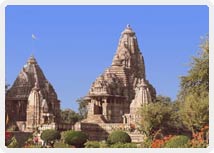 Is the seat of an eight-feet high lingam made of yellow sandstone. Legend tells us that that Lord Shiva who lived an austere life in the Himalayas was served well by Parvati, the beautiful daughter of the mountains. Shiva opened his eyes, saw Parvati and immediately fell in love. However, Shiva opened his third eye and reduced the God of Love to ashes, as he was angry that his meditation had been disturbed. The world was immediately filled with a mournful darkness, for love had died. Then Shiva, to reaffirm his omnipotence, power and wonder caused a great linga to appear before them, which is the image in the Matangeswara temple. This myth only adds weight to the theory that the temples at Khajuraho were built to celebrate certain episodes in the marriage of Shiva and Parvati and also helped explain why Khajuraho was venerated as sacred to Shiva and why devotees continued to worship this particular Shivalinga long after the other more monumental temples were abandoned. Some writers also view Khajuraho as a depiction of wedding celebrations of Lord Shiva and Parvati. This temple has contributed with its mainstream architecture themes , in contrast to the aberrant themes of the other temples.
Is the seat of an eight-feet high lingam made of yellow sandstone. Legend tells us that that Lord Shiva who lived an austere life in the Himalayas was served well by Parvati, the beautiful daughter of the mountains. Shiva opened his eyes, saw Parvati and immediately fell in love. However, Shiva opened his third eye and reduced the God of Love to ashes, as he was angry that his meditation had been disturbed. The world was immediately filled with a mournful darkness, for love had died. Then Shiva, to reaffirm his omnipotence, power and wonder caused a great linga to appear before them, which is the image in the Matangeswara temple. This myth only adds weight to the theory that the temples at Khajuraho were built to celebrate certain episodes in the marriage of Shiva and Parvati and also helped explain why Khajuraho was venerated as sacred to Shiva and why devotees continued to worship this particular Shivalinga long after the other more monumental temples were abandoned. Some writers also view Khajuraho as a depiction of wedding celebrations of Lord Shiva and Parvati. This temple has contributed with its mainstream architecture themes , in contrast to the aberrant themes of the other temples.
Excursion to Panna National Park
 After all the temple tourism, get set for a taste of wildlife with a trip to the Panna National Park. 32 kms. away from Khajuraho, it stretches along the river Ken. The jungles harbor many species of wildlife. Panna National Park is natural habitat of the tiger, with other rare species such as the Leopard, Wolf, Gharial, Herds of Bluebull, Chinkara and Sambar. On the road to Panna are the spectacular Pandav Falls. Legend has it that the Pandavs of Mahabharat spent a major part of their banishment period in the forests of the Panna National Park. The park initially served as the private hunting region of the royal family of Panna. After independence, the park was declared a wildlife sanctuaryto protect the various forms of flora and fauna. It is in the year 1981 that this park was declared a National Park and now it attracts the attention of wildlife enthusiasts in large numbers. Panna is famous for its diamond mining industry and this makes it an interesting place to visit.
After all the temple tourism, get set for a taste of wildlife with a trip to the Panna National Park. 32 kms. away from Khajuraho, it stretches along the river Ken. The jungles harbor many species of wildlife. Panna National Park is natural habitat of the tiger, with other rare species such as the Leopard, Wolf, Gharial, Herds of Bluebull, Chinkara and Sambar. On the road to Panna are the spectacular Pandav Falls. Legend has it that the Pandavs of Mahabharat spent a major part of their banishment period in the forests of the Panna National Park. The park initially served as the private hunting region of the royal family of Panna. After independence, the park was declared a wildlife sanctuaryto protect the various forms of flora and fauna. It is in the year 1981 that this park was declared a National Park and now it attracts the attention of wildlife enthusiasts in large numbers. Panna is famous for its diamond mining industry and this makes it an interesting place to visit.
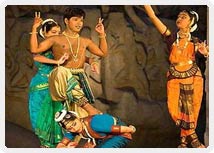 A visit to the Western group of temples is neatly rounded off with the Light and Sound show held evrey evening. Khajuraho Dance Festival is one of those festivals of India that all dance lovers eagerly wait for. The 7-day Khajuraho Dance Festival, which is supposed to take place from 25th February to 2nd March every year from 2002 to 2009 highlights the richness of the Indian classical dance. This festival sees performance by some of the best classical dancers in India every year, who perform against the spectacular backdrop of the magnificently lit temples. The various dances performed here are Kathak, Odissi, Bharat natyam....showcases the sevreal classical dances of India.Tourists from other coun...
A visit to the Western group of temples is neatly rounded off with the Light and Sound show held evrey evening. Khajuraho Dance Festival is one of those festivals of India that all dance lovers eagerly wait for. The 7-day Khajuraho Dance Festival, which is supposed to take place from 25th February to 2nd March every year from 2002 to 2009 highlights the richness of the Indian classical dance. This festival sees performance by some of the best classical dancers in India every year, who perform against the spectacular backdrop of the magnificently lit temples. The various dances performed here are Kathak, Odissi, Bharat natyam....showcases the sevreal classical dances of India.Tourists from other coun...
Accommodation and food
Khajuraho is doing well as a tourist destination, what with the variety of restaurants catering to the cullinary needs of tourists from across the world. Try Italian food, South Indian, Punjabi, Jain thalis.
Climate
Khajuraho has extremes of climate.While summers are extremely hot, winters are pleasant and a better time to visit .Head to Khajuraho anytime from September-March.March is when the Dance Festival is on, that's an absolute do not miss.
How to get there
Khajuraho airport is well -connected to DElhi, Varanasi and Mumbai.Rail links connect the city to the rest of the country. The Delhi-Jhansi Dakshin express is the best bet-Khajuraho is five hours from Jhansi by road. Buses ply regularly on the Satna and Jhansi routes.
Shopping
Handicrafts is what you should concentrate on, if you want to remember your Khajuraho trip. Iron, brass and stone sculptures that come in Kama Sutra poses are a Khajuraho speciality and are available at the handicraft stores in the town. Pick up some curios as a souvenir. THE Crafts Emporium, Jain Temple Road and the Tuesday bazaar at Rajinagar are good bets for silver and brass ware shopping.
Tajmahal Tours
Golden Triangle India
- Golden Triangle with Corbett
- Golden Triangle with Goa
- Golden Triangle with Kathmandu
- Golden Triangle with Wildlife
- Indian Heritage Tour with Tajmahal
- Buddhist Pilgrimage with Golden Griangle Tour
- Golden Triangle Tour
- Golden Triangle Tour with Haridwar and Rishikesh
- Golden Triangle with Khajuraho Varanasi
- Golden Triangle with Kashmir
- Tajmahal with Pushkar Fair
Delhi Tourism
Jaipur Tourism
Agra Tourism
Golden Triangle Extension
- Ranthambhor National Park
- Khajuraho Tourism
- Varanasi Tourism
- Rishikesh Tourism
- Haridwar Tourism
- Corbett Wildlife Sanctuary
- Mathura Travel
- Vrindavan Travel
- Gwalior Travel
Activities to Do
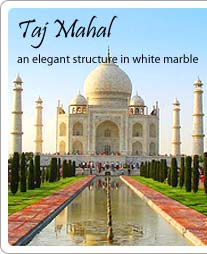

Copyright © 2020, www.tajmahal-india-tours.com
Recognized by Ministry of Tourism, Government of India
National Tourism Award Winner
Powered by SOFTTIX

